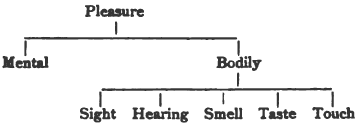In the tenth, eleventh, and twelfth sections that finish the third book of The Nicomachean Ethics, Aristotle discusses the virtue of temperance.
In the same way that courage is a mean between extremes of response to fear; temperance is a mean between extremes of response to pleasure. On one extreme is the self-indulgent person; on the other is someone who is insensible, or possibly anhedonic.
This latter extreme is a much more rare vice than its opposite, and so we lack a precise word for it — Aristotle calls people who practice this vice “almost imaginary characters” — and so the vice exists mostly in the abstract. This just reminds me of what I found so unsatisfying about Aristotle’s Goldilocksian theory of virtue. Fortunately, although Aristotle was clearly very attached to this pet theory, most of what I find interesting about his ideas of ethics doesn’t rely on it.
Courage and temperance are linked also in being “virtues of the irrational parts” — that is, they respond to and regulate our responses to fear and appetite, which are very basic animal impulses.
Temperance only concerns a particular subset of bodily pleasures (so not, for instance, the pleasure of gossiping or of learning). Aristotle calls this subset the pleasures that concern touch, which he defines to include things like eating, drinking, and sex, but to exclude other sensual things like listening to music or delighting in pleasant smells.

Illustration showing the varieties of pleasure, from St. George Stock’s paraphrase (). Only the pleasures of touch are the concern of temperance.
Some appetites for this variety of pleasure are universal (for instance hunger or lust), while others are peculiar to the individual, and some people exhibit their appetite for the universal pleasures in peculiar ways (being especially fond of a particular food, or fetishistic about sex).
There are three ways to go wrong in an excess of appetite for bodily-touch pleasure:
- You can delight in the wrong thing.
- You can delight in something too much.
- You can delight in the wrong manner.
Aristotle says that self-indulgent people do all three.
Appetite is a form of pain, and the self-indulgent are pained more than they ought to be over not getting their favorite varieties of bodily-touch pleasure. Temperate people are not so overpained.
Fear is more disruptive to the senses and to the reason than pleasure is, and so it is easier to forgive cowardice than intemperance. Self-indulgence is more of a voluntary vice than cowardice is, and so is more worthy of reproach. Self-indulgent acts are voluntary (they result from internal cravings & desires), but the state of being a self-indulgent person is less so (nobody wants to be intemperate). By contrast, cowardly acts are often painful/shameful and are performed as if they were involuntary (compelled by fear).
In Greek, the word Aristotle uses for “self-indulgent” or “intemperate” is the same one used for “unchastened” as in a spoiled child. Aristotle thinks this is apt, as temperance is about disciplining the needy child inside of us, so that none of our appetites exceed in strength the control of our reason.
That, then, is my summary of what Aristotle has to say about temperance. For me, these sections were a bit of a yawn. With all of the gluttony and unrelenting shallow commercial sexual titillation in America today, you’d think that there would be something in these sections that would jump out as insightful and valuable and applicable to our place and time. But in all, I just thought these sections were dry and not particularly useful.
Index to the Nicomachean Ethics series
Aristotle’s Nicomachean Ethics
- Introduction
- Book Ⅰ
- Book Ⅱ
- Book Ⅲ
- Book Ⅳ
- Book Ⅴ
- Book Ⅵ
- Book Ⅶ
- Book Ⅷ
- Book Ⅸ
- Book Ⅹ
- Bibliography
